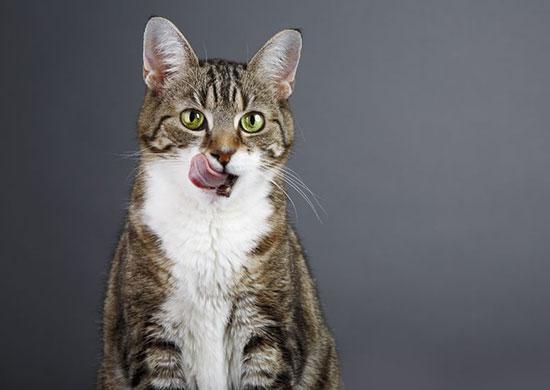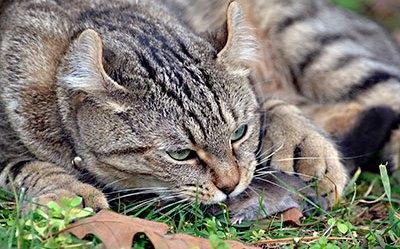This content is archived from the Feline Nutrition Foundation
Answers: Do Cats Need Dietary Fiber?
- Updated: Saturday, May 04, 2019 05:42 PM
- Published: Saturday, September 20, 2014 06:30 PM
- Written by Elisa Katz, DVM
 Do cats need fiber in their diet? Being strict meat-eaters, how would they get it in their natural diet, since they wouldn't be eating plant material?
Do cats need fiber in their diet? Being strict meat-eaters, how would they get it in their natural diet, since they wouldn't be eating plant material?
Dietary fiber is the indigestible portion of food derived from plants.¹ There are different types of plant-based fiber. There are soluble and insoluble fibers as well as rapidly-fermentable and slowly-fermentable fibers. Soluble fibers are also rapidly fermentable. These fibers, which include pectins and gums, can act like a gel and draw water into the colon. Fermentable fibers can also be fermented by bacteria in the gut to produce short chain fatty acids which can be utilized by the cells of the colon to help them function. Soluble and rapidly-fermentable fibers tend to add moisture to the stool and decrease gastrointestinal transit time. These types may be beneficial in the case of constipation. Slowly-fermentable and insoluble fibers tend to increase gastrointestinal transit time and "bulk up" the stool. These types, which include cellulose and peanut hulls, may be beneficial in the case of diarrhea. Most of the sources used in pet foods are moderately fermentable, so have some qualities of both. Moderately-fermentable sources include: brans, soy fibers, soy hulls and beet pulp.²
Many commercial cat foods contain plant-derived fiber. But, do cats need it? The short answer is no. Cats are obligate carnivores. They do not require dietary fiber.³ Any plant-derived fiber that a cat might consume as part of a natural prey diet would be from the prey's stomach and will have already been partially if not completely digested.
 However, the natural diet of cats would consist of the whole prey, including fur, tendons, bone collagen, ligaments and cartilage. Most of these are not digested or are incompletely digested, so would function as fiber. They would pass through the intestinal system as bulk and not be assimilated and may or may not be fermented. A study in 2012 on captive cheetahs determined that those fed a whole prey diet of rabbit carcasses showed a more favorable fecal fatty acid profile than those fed beef meat plus a vitamin/mineral supplement. These findings suggest that a small amount of it is indeed beneficial in the feline diet and may even be necessary for optimum gut health.⁴ The question then becomes, is plant-derived fiber an adequate substitute for what the cat would consume in the wild?
However, the natural diet of cats would consist of the whole prey, including fur, tendons, bone collagen, ligaments and cartilage. Most of these are not digested or are incompletely digested, so would function as fiber. They would pass through the intestinal system as bulk and not be assimilated and may or may not be fermented. A study in 2012 on captive cheetahs determined that those fed a whole prey diet of rabbit carcasses showed a more favorable fecal fatty acid profile than those fed beef meat plus a vitamin/mineral supplement. These findings suggest that a small amount of it is indeed beneficial in the feline diet and may even be necessary for optimum gut health.⁴ The question then becomes, is plant-derived fiber an adequate substitute for what the cat would consume in the wild?
The natural diet of cats – such as rodents and rats – would contain approximately 0.55% fiber.⁵ Why then, is plant-derived fiber such a large component in many commercial cat foods, sometimes in amounts as high as ten percent? The answer is likely because plant-sourced ingredients cost significantly less to include than other ingredients.
High amounts have been touted as an effective treatment for diarrhea because, when consumed, it tends to slow digestion and add bulk to the stool. This is due to its tendency to attract water and form a gel. However, high fiber may also decrease the secretion of pancreatic enzymes necessary for digestion of protein.⁶ Cats already have a lower amount of pancreatic enzymes than other mammals, so a high amount in the cat's diet is likely to result in decreased absorption and assimilation of nutrients. I have seen this in many cats fed a commercial prescription diet known to be high in fiber. Their coats become dry and flaky and their stools become huge.
In addition, it has been touted as a way to get cats to lose weight. However, most cats do not readily accept a high-fiber food as they naturally crave protein and fat. Additionally, other than what the pet food companies themselves tout as reliable studies, I am unaware of any actual study or experiences from colleagues that prove cats lose weight on a high-fiber diet.
Additional Reading
Get Kitty Exercising to Trim Down
The bottom line is that it appears that healthy cats on a bio-appropriate raw cat food diet have very little if any need for fiber. In some cases, it may help with diarrhea or constipation depending on the type of fiber and the root cause of the problem.
Note: Feline Nutrition provides feline health and nutrition information as a public service. Diagnosis and treatment of specific conditions should always be in consultation with your own veterinarian. Feline Nutrition disclaims all warranties and liability related to the veterinary advice and information provided on this site.
Dr. Elisa Katz, DVM, is a graduate of Ohio State University and is the owner of Natural Pet Animal Hospital in Bourbonnais, Illinois. She practices holistic and integrative medicine focusing on proper diet and nutrition. Dr. Katz shares her home with four kitties and one dog.
1. "Dietary Fiber: Essential for a Healthy Diet," Mayo Clinic Online.
2. Michael S Hand, DVM, PhD; Craig D Thatcher, DVM, MS, PhD, Rebecca L Remillard, PhD, DVM, and Philip Roudebush, DVM, Small Animal Clinical Nutrition, 4th ed. Walsworth Publishing Company, 2000, 48.
3. Hand, et al, Small Animal Clinical Nutrition, 310.
4. S Depauw, G Bosch, M Hesta, K Whitehouse-Tedd, WH Hendriks, J Kaandorp and GP Janssens, "Fermentation of Animal Components in Strict Carnivores: A Comparative Study with Cheetah Fecal Inoculum," Journal of Animal Science 90, no. 8, Aug 2012, 2540-2548.
5. Michael S Hand, DVM, PhD; Craig D Thatcher, DVM, MS, PhD, Rebecca L Remillard, PhD, DVM, and Philip Roudebush, DVM, Small Animal Clinical Nutrition, 4th ed. Walsworth Publishing Company, 2000, 297.
6. G Isaksson, I Lundquist and I Ihse, "Effect of Dietary Fiber on Pancreatic Enzyme Activity in Vitro," Gastroenterology 82, no. 5. Part 1, May 1982.




